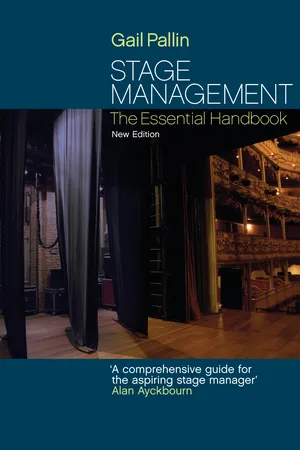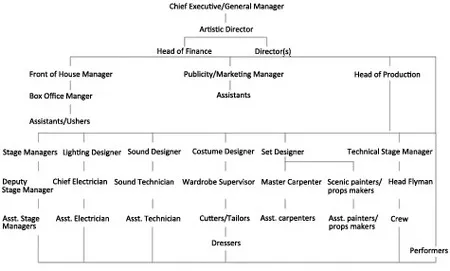
- 176 pages
- English
- ePUB (mobile friendly)
- Available on iOS & Android
About this book
The highly successful 'Bible for any stage manager', now in a revised edition updated in 2024.
The stage manager is at the core of every successful theatre production: organising, managing and running rehearsals and performances; researching and procuring the props and furniture; and providing a creative information flow between the production and design departments.
This handbook is for students, graduates and all those who aspire to stage management, whether amateur or professional, on a large or small scale. Complete with charts and helpful checklists, it takes the reader through a typical production, week by week.
Other useful topics covered are:
- Team dynamics and job roles
- Theatre unions
- Health and Safety legislation
- The job market
- Production templates
- Management techniques and interpersonal skills
- Creativity in stage management
As well as updated information and resources throughout, this new edition includes two brand new sections: New Technology in Stage Management, and Sustainability in the Production Process. There are also case studies of professional stage managers and producers working in the field.
'A comprehensive guide for the aspiring stage manager' Alan Ayckbourn
Frequently asked questions
- Essential is ideal for learners and professionals who enjoy exploring a wide range of subjects. Access the Essential Library with 800,000+ trusted titles and best-sellers across business, personal growth, and the humanities. Includes unlimited reading time and Standard Read Aloud voice.
- Complete: Perfect for advanced learners and researchers needing full, unrestricted access. Unlock 1.4M+ books across hundreds of subjects, including academic and specialized titles. The Complete Plan also includes advanced features like Premium Read Aloud and Research Assistant.
Please note we cannot support devices running on iOS 13 and Android 7 or earlier. Learn more about using the app.
Information

Table of contents
- Cover
- Title Page
- Dedication
- Contents
- Foreword by Sir Alan Ayckbourn
- Introduction by Kevin Eld
- 1 Team Dynamics and Roles
- 2 The Preparation Period
- 3 The Rehearsal Period
- 4 Props Management
- 5 Pre-Production Week
- 6 Production Week
- 7 The Run
- 8 Management Techniques
- 9 Health and Safety
- 10 Theatre Unions
- 11 The Job Market
- 12 Case Studies
- 13 Creativity in Stage Management
- 14 Information and Communication Technology in Stage Management
- 15 Further Reading
- 16 Templates
- 17 Glossary
- Index
- Acknowledgements
- About the Author
- Copyright Information